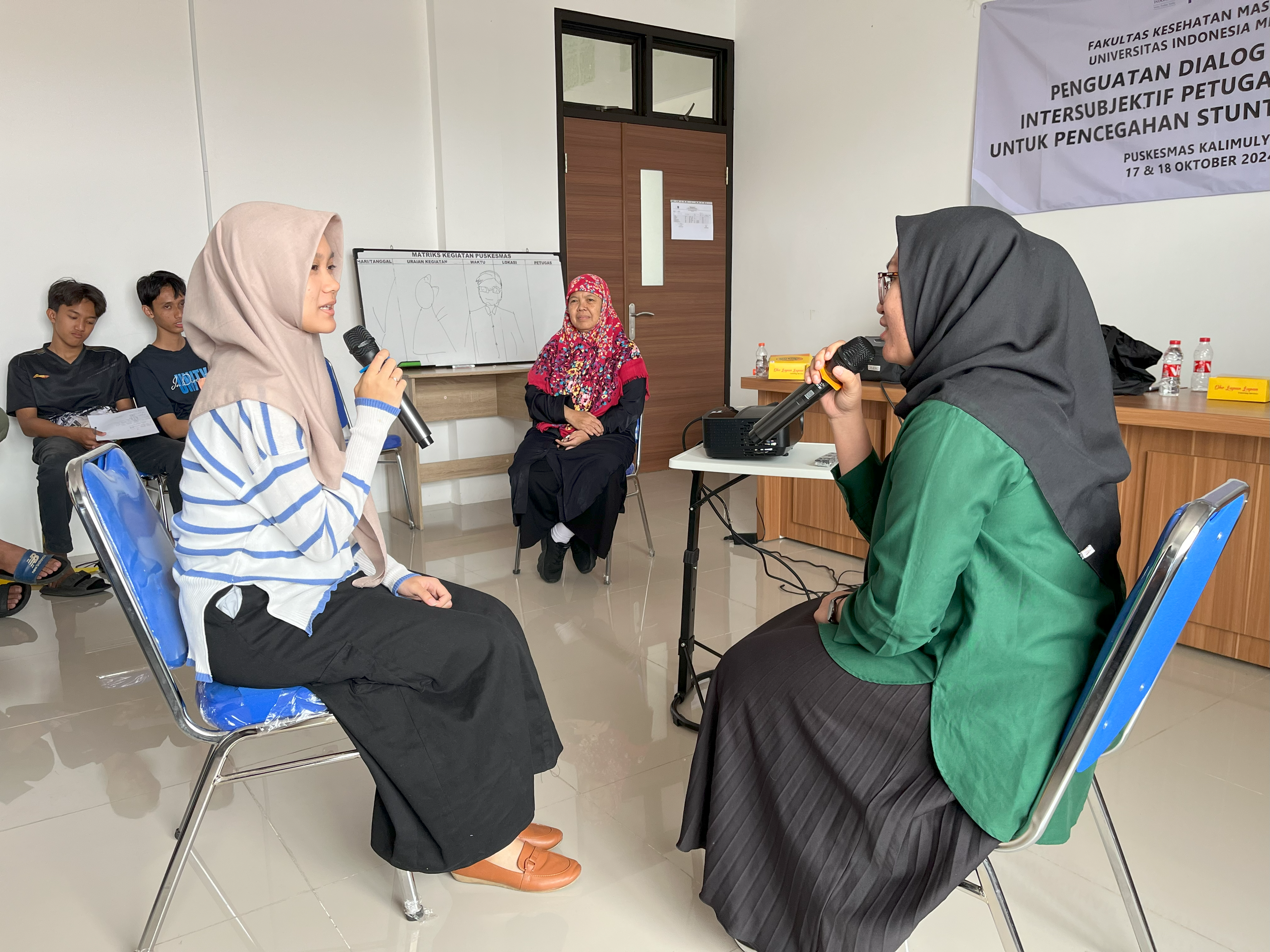Supporting the national program to reduce stunting rates, the Faculty of Public Health (FPH) at the Universitas Indonesia (UI) has collaborated with community health centers (Puskesmas) in Depok City to design a youth empowerment program through the revitalization of the Adolescent Health Care Services (PKPR). Currently, the utilization of PKPR is not optimal, and its existence is not widely known. Held on Thursday and Saturday, October 17 and 19, 2024, at the Kalimulya Puskesmas in Depok, this community service program organized by the FPH UI Community Service Team aims to enhance dialogical capacity and build intersubjective relationships between health workers and adolescents as an effort to increase the attractiveness of PKPR for youth utilization. The use of PKPR is expected to raise adolescents’ awareness and knowledge about their strategic role in preventing stunting from an early age.
According to data from the United Nations International Children’s Emergency Fund (UNICEF) and the WHO, Indonesia ranks 27th out of 154 countries in terms of stunting prevalence. Among Asian countries, Indonesia ranks 5th. Although the stunting rate in Indonesia decreased from 24.4% in 2021 to 21.6% in 2022, the national target of a stunting prevalence rate of 14% by 2024 has not yet been achieved. A similar situation occurs in Depok City, West Java. Depok has 22 sub-districts that have seen an increase in stunting prevalence.
Adolescents play a key role in efforts to prevent stunting. The current demographic bonus makes the adolescent age group significant, with more than 23% of Depok City’s population falling within this age range. However, the biggest challenge is the low awareness among adolescents regarding their own health, particularly in relation to the risks of generating a stunted generation due to imbalanced nutrition, anemia, and early marriage. According to the Ministry of Health, only 24.6% of adolescent girls (Rematri) have undergone anemia screening, far below the target of 70%.
According to Prof. Dr. Dra. Dumilah Ayuningtyas, M.A.R.S., Head of the FPH UI Community Service Program, “Adolescent health is a crucial factor in shaping a future generation free from stunting. Through the revitalization of PKPR at the community health centers, we aim to build better relationships between healthcare workers and adolescents, so they become more aware and responsible for their health, and can play a role as agents of change.”
The PKPR program focuses on preventing stunting in adolescent girls. However, the implementation of this program in Depok City has encountered several challenges. The revitalization of PKPR aims to address several key issues, including:
- The lack of PKPR targets based on regions that are integrated with stunting prevention efforts.
- Limited human resources (HR) and infrastructure affecting the sustainability of PKPR services.
- Minimal cross-sector support in strengthening PKPR efforts.
- Low participation of adolescents as the target of the program.
Through strengthening dialogue and an intersubjective relational approach, this program not only enhances the competence of healthcare workers but also encourages adolescents to actively participate in stunting prevention activities.
As an educational institution committed to improving public health, the University of Indonesia aims to support government efforts to reduce stunting rates, particularly in Depok City. With a strong scientific foundation and open system management technology, this program is expected to become an effective and sustainable intervention model.
On the other hand, the Faculty of Public Health (FPH) at the University of Indonesia (UI) is one of the leading institutions in Indonesia in the field of public health. FPH UI is highly committed to developing innovative programs aimed at improving the quality of life for the Indonesian population. As part of this effort, FPH UI is actively involved in various community service initiatives aimed at solving national health issues, including efforts to reduce stunting rates.
“Depok is one of the largest cities in West Java, and as the location of the University of Indonesia, we feel a responsibility to contribute meaningfully to the success of this national program,” added Prof. Dumilah.
This revitalization program for PKPR is expected to improve the quality of healthcare services for adolescents at community health centers in Depok City. Through youth empowerment and the revitalization of PKPR, adolescents will not only become recipients of benefits but also play an active role as agents of change towards a stunting-free Depok City in the future.

